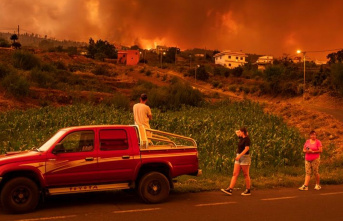People with fear filled eyes and few belongings fleeing their homes. Skies obscured by dark smoke for days. Flames eating closer and closer to inhabited areas. Scorching heat, suffocating air and wailing fire brigade sirens.
Two weeks after the devastating forest fires in Hawaii with at least 114 fatalities, fires in many places are keeping tens of thousands in suspense. On Sunday, the fire continued to flare up, especially on the Canary Island of Tenerife, which is popular with holidaymakers, in Greece and in several provinces in Canada.
So far there have been no reports of deaths anywhere. But the suffering is great. For example in Tenerife: "We panicked (...) this is a catastrophe for us Canarios," retiree Antonio Jiménez told the regional digital newspaper "CanariasAhora". Despite all the agonizing fear, the 65-year-old and his wife stayed with their animals for the first few nights after the fire broke out on Tuesday evening - until they left their finca at the weekend. Another evacuated woman said on TV: "It makes you cry."
arson as the cause
On Tenerife, the flames have already covered 11,600 hectares of nature. That corresponds to the area of a good 16,000 soccer fields - or almost six percent of the territory of the Spanish Atlantic island. The police now consider arson to be the cause. According to official estimates, by Sunday more than 12,000 people had followed the authorities' call for evacuation in the affected areas in the north and north-east.
However, one does not know exactly, because the vast majority does not go to the emergency shelters set up especially in gyms, but to friends and relatives. In the meantime, normality prevailed in the tourist areas, it said.
Canary Islands Prime Minister Fernando Clavijo spoke of one of the worst fires on the island in the past 40 years. Up to 300 firefighters and 24 firefighting planes and helicopters are deployed simultaneously to fight the fire. The terrain that is difficult to access, the adverse weather conditions with extreme drought, heat of up to 34 degrees and strong winds as well as the heavy smoke development made extinguishing work difficult.
fires in Greece
In the extreme north-east of Greece, several large forest and bush fires were partly brought under control on Sunday with the massive use of fire-fighting aircraft. "The situation is a little better," a firefighter told state radio (ERA -1). But the danger is not over yet.
According to the authorities, the flames damaged several houses in the village of Loutros and also destroyed agricultural land. Eight villages near the city of Alexandroupolis were evacuated. "It was a very difficult night," Mayor Giannis Zamboukis said on state radio.
Canada: Thousands have been evacuated
The situation in Canada was even more difficult. In the province of British Columbia, two fires merged into one blaze covering more than 41,000 hectares by Saturday evening. The region around Shuswap Lake in the south of the province was affected. Destroyed houses and burnt-out cars could be seen in the CBC broadcaster in the town of Scotch Creek. There was no official information about the damage.
Orders were in place across the province for around 35,000 people to be brought to safety, Prime Minister David Eby said. Tourist trips to the affected areas have been banned with immediate effect so that accommodation for emergency services and evacuees can be kept free.
Fierce forest fires are also raging about a hundred kilometers further south on Okanagan Lake, which is popular with tourists. The so-called McDougall Creek Fire, which among other things threatens the city of West Kelowna, covered an area of 11,000 hectares, according to estimates by the authorities on Sunday. The fire had increased in size more than tenfold since Friday. Thousands of people had to leave their homes and several buildings were destroyed.
Experts are not surprised
Wildfires are common in many regions of Canada. However, they are currently experiencing the worst known season in the country's history. "This is pre-programmed by the drying out of the soil, the forests and the wetlands," said Johann Georg Goldammer, who heads the Center for Global Fire Monitoring at the Max Planck Institute for Chemistry and at the University of Freiburg. The climate used to be cold and humid. This is changing mainly due to extreme weather conditions.
Outliers such as longer periods of drought are decisive. "They make the forest more ready to burn." Experts elsewhere are not surprised either: "One thing is clear: climate change is increasing extreme weather events," emphasizes Ruben del Campo, spokesman for the Spanish weather service Aemet, again and again.












